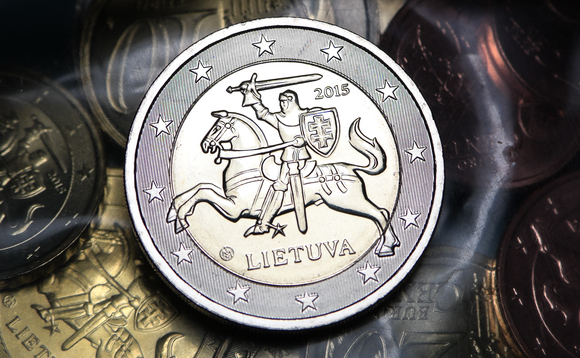
Lithuania's entry into eurozone spells good news for PE

Lithuania's adoption of the euro on January 1 is a boon for local businesses and should also benefit private equity, both locally and throughout the CEE region. Alice Murray reports
On January 1, Lithuania became the 19th country to adopt the euro. The switch to the single currency will of course bring about obvious benefits as Lithuanian companies will no longer have to spend on currency conversion – and the private equity industry is likely to enjoy further advantages.
"The main benefit for private equity will be for everyday business activities. There will also be savings made by no longer paying out for currency exchange," says Mindaugas Utkevičius, Vilnius-based partner at Livonia Partners.
While these are both positive effects of joining the shared currency, the main impact of the move is the message Lithuania is sending out to its neighbours. Despite around one in 20 Lithuanians being Russian speakers, as well as the country's proximity to Russia, Lithuania has clearly aligned itself with Europe and the West by joining the eurozone. "From a political perspective it creates a safer feeling," says Utkevičius.
Russia accounts for around 30% of Lithuanian exports, which for a small economy represents a substantial chunk of trade. While sanctions on Lithuanian exports are currently in place, Utkevičius does not see this as a major concern. "The impact is mostly sector based – the embargoes mainly affect meat, dairy products and transport companies. But this has been ongoing. The country has had many sanctions imposed on it over the years and companies are used to it. They are nimble and able to find new export markets."
Fundamental attractions
According to Utkevičius, 2014 was a busy year in terms of M&A activity, but competition in the private equity space appears limited. "Larger deals, which are few, is where there is most likely to be competition among international players. In the lower mid-market, the €5-15m range, competition is more local. Competition for deals is there but I don't expect it to become heated."
The relative lack of private equity penetration in the country seems at odds with Lithuania's growth prospects. According to the World Bank, Lithuania is forecast to see GPD growth of 3.2% in 2015, 3.5% in 2016 and 3.7% in 2017, representing one of the highest growth rates in Europe.
On top of this, the lending landscape is likely to improve. "The Lithuanian and Baltic markets are dominated by Scandinavian banks, which are rather conservative and only provide moderate financing for deals. This is both good and bad. The obvious impact is on returns, but on the positive side, businesses are more stable and better equipped to weather tough times," says Utkevičius. However, by joining the euro, local and neighbouring lenders could be more inclined to finance deals thanks to the ease of operating in a single currency.
Under-educated
While Lithuania enjoys attractive fundamentals, one obstacle to overcome is educating the local business community of the benefits of private equity. "The asset class is restarting itself, with the EIF's Baltic Innovation fund-of-funds aimed at boosting activity. As a consequence, the Baltic private equity associations have been more active in educating the business community," says Utkevičius. "There is still more education needed, particularly explaining the possibilities of private equity and how it works."
And this lack of awareness when it comes to private equity could be one of the factors contributing to a relatively sluggish fundraising market. "The biggest challenge here is attracting enough capital. Teams are under-experienced compared to their counterparts in more established markets; they have a smaller track record so fundraising takes longer. This is something the industry will overcome in time," says Utkevičius.
Of course, the best way to boost investment inflows is through big-hitting exits. In the final week of 2014, SEB Venture Capital exited Lithuanian cable TV and broadband internet provider Cgates to East Capital-backed Starman, in a deal worth €56.3m. And Utkevičius expects more of this activity in 2015.
Latest News
Stonehage Fleming raises USD 130m for largest fund to date, eyes 2024 programme
Sponsor acquired the public software group in July 2017 via the same-year vintage Partners Group Global Value 2017
Stonehage Fleming raises USD 130m for largest fund to date, eyes 2024 programme
Czech Republic-headquartered family office is targeting DACH and CEE region deals
Stonehage Fleming raises USD 130m for largest fund to date, eyes 2024 programme
Ex-Rocket Internet leader Bettina Curtze joins Swiss VC firm as partner and CFO
Stonehage Fleming raises USD 130m for largest fund to date, eyes 2024 programme
Estonia-registered VC could bolster LP base with fresh capital from funds-of-funds or pension funds









